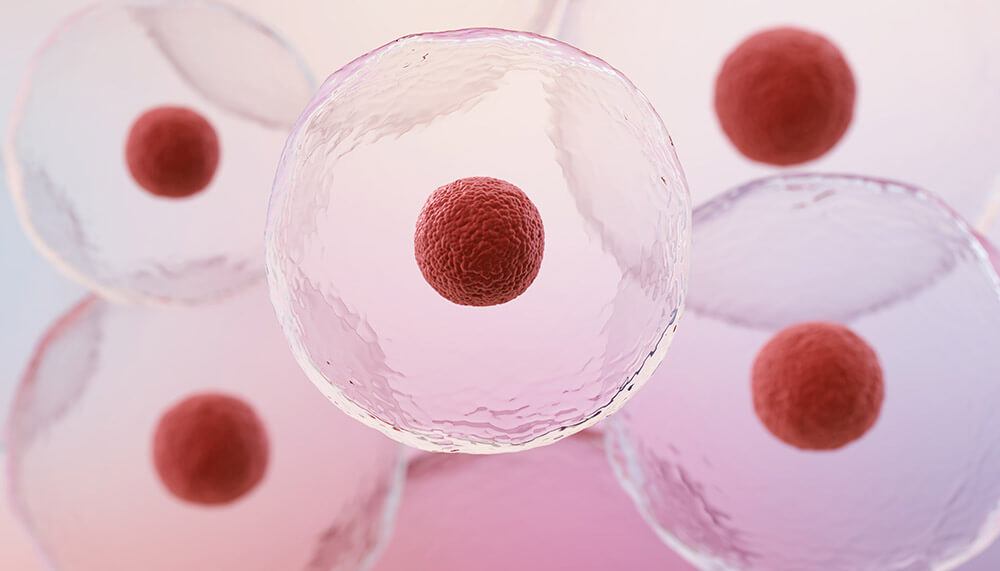Calls for Ukraine
Calls for Europe
Calls for USA

Menopause is the term for the end of menstruation. Natural menopause is the complete cessation of the menstrual cycle for physiological reasons. They are associated with the depletion of the follicular reserve (ovarian reserve) and a decrease in the level of estrogen circulating in the blood. After menopause, a woman cannot become pregnant unless specialized methods are used.
The hormonal changes associated with menopause affect a woman’s physical, emotional, mental and social well-being. The symptoms that occur during and after the menopausal transition vary significantly from person to person. In some women, they are mild, in others they can be serious and extremely negatively affect daily activities, as well as quality of life.
Currently, hormonal drugs are used to treat menopause. Unfortunately, replacement therapy is not suitable for everyone due to possible side effects. Therefore, in recent years there has been an active search for alternative methods of treatment, and the use of cellular technologies is one of the most promising areas in this area.
The first manifestations of hormonal changes associated with the completion of the reproductive age appear during the period of perimenopause. Its hallmark is menstrual irregularities. Menstruation becomes irregular: the cycle is shortened or lengthened. Additional symptoms are breast tenderness, hot flashes, night sweats, fatigue, and irritability. For some women, the symptoms of menopause may appear 5-10 years before the last menstrual period.

How to understand that you have menopause?
A woman can understand that menopause has occurred if she has not had menstrual bleeding for 12 months. In most cases, this occurs between the ages of 45 and 55 (average 51 years). Menopause before the age of 40 is called “premature”, and before the age of 45 – “early”.
Typical symptoms of menopause are:
The cessation of physiological estrogen production during menopause can lead to symptoms that range in severity from unpleasant to pathological. Only 20% of women report no symptoms of menopause. The rest need medication. Therefore, the development of new, effective and safe methods for alleviating menopausal symptoms is one of the urgent problems of modern medicine.
The most common manifestations of menopause are hot flashes and night sweats. More than 57% of all women experience these two symptoms during menopause. Most often, hot flashes appear between the ages of 45 and 49 years. With moderate to severe severity, symptoms can persist for up to 10 years. Some women experience hot flashes and night sweats after age 80.

The duration of the tides varies. Some can last from a few minutes to half an hour. A sudden feeling of heat often begins in the face or chest and spreads throughout the body. These symptoms are caused by a sudden change in the level of hormones that are responsible for the body’s thermoregulation. In addition to feeling hot, women may experience increased heart rate, profuse sweating, redness of the face, and anxiety. Treatment of hot flashes involves the use of hormonal drugs.
Menopause and climacteric are two terms that are associated with the changes that occur in the body of a woman coming out of reproductive age.
Menopause (or menopausal transition) is the period in a woman’s life that precedes menopause. It is characterized by a gradual extinction of the reproductive function. Usually begins at the age of 45-55 years. At this stage of life, a woman begins to decrease the production of the hormone estrogen, which leads to the appearance of various symptoms, such as hot flashes, night sweats, sleep disturbance, irritability, vaginal dryness, etc. The menstrual cycle in perimenopause continues, although it may be irregular.

Menopause is the last period in a woman’s life when her ovaries stop producing eggs. After menopause, she can no longer conceive. During this period, the woman continues to have menopausal symptoms, and they are usually more pronounced, as the level of estrogen decreases significantly.
Thus, the main difference between menopause and climacteric is that menopause is the period before the last menstrual period, when estrogen levels gradually decrease, while menopause is the end point, when menstruation stops completely.
Usually, special studies are not required to diagnose menopause. Sometimes a doctor may recommend tests to determine levels of hormones such as:

Diagnosis of menopausal syndrome is needed to assess the general health of a woman and select a therapeutic strategy. The list of necessary studies is determined by the doctor after clarifying the anamnesis and physical examination. As a rule, it includes:
Based on the results of the diagnosis, the doctor selects further tactics for managing the patient.
Treatment of menopause is carried out if its course is pathological. Non-drug methods are:
As part of the pharmacological therapy of pathological menopause, sedatives, antidepressants, vitamin complexes, as well as local preparations to relieve itching in the vagina are used.
During menopause, a woman’s ovaries produce very low levels of estrogen and progesterone. Hormone therapy can make up for this deficiency and reduce the severity of symptoms. Synthetic hormones are usually taken in pill form every day. Recently, special patches have also appeared that allow hormones to enter the bloodstream transdermally, that is, through the skin.

The main disadvantage of hormone replacement therapy for menopause is that it is not suitable for all women. Taking estrogen can be hazardous to health in the following cases:
If there are contraindications to hormone therapy, the doctor may advise taking bioidentical (herbal) preparations that replace synthetic hormones. However, so far their effect on the body has not been scientifically confirmed. Therefore, there is now an active search for additional methods that would help relieve the symptoms of menopause, and the most promising of these is regenerative medicine.
Treatment of menopause with stem cells is an innovative approach that is becoming increasingly popular. It is recommended to start it during perimenopause. Cellular therapy helps to prevent the onset of premature or early menopause and to avoid the development of a pathological menopause.
Recently, mesenchymal stem cells have been actively studied, which can be obtained from the bone marrow, adipose tissue or blood of a patient. In the treatment of menopause, MSCs derived from adipose tissue have shown particular effectiveness. They are present in it in a fairly large amount, and are also distinguished by a high ability to proliferate (self-production), pronounced immunomodulatory properties, as well as active secretion of regenerative factors.
Recently, MSC therapy has been considered as a method of regenerating damaged tissues and rejuvenating organs. Many studies have demonstrated the effectiveness of stem cells in the treatment of diseases associated with reproductive dysfunction and hormone deficiency.

Recovery of ovarian function with stem cells
It is known about the positive effect of MSC therapy on the restoration of ovarian function in case of premature follicular insufficiency (loss of reproductive and hormonal functions of the ovaries in women under the age of 40 years). Premature menopause not only leads to infertility in young women, but also to the deterioration of their physical and mental health.
In one study, the introduction of stem cells allowed two women to increase the level of estrogen in the blood 3 months after injections. The effect lasted at least one year. Patients experienced significant relief of menopausal symptoms. In 6 participants of the same experiment, a few months after the introduction of stem cells, menstruation resumed.
There is also evidence that a 45-year-old perimenopausal woman who underwent stem cell therapy was able to become pregnant and give birth to a healthy baby weighing 2.7 kg using assisted reproductive technologies. The patient opted for experimental therapy because the alternatives, such as using donor eggs or adopting a child, were unacceptable to her.
Treatment of menopause symptoms with stem cells
Recently, MSC studies have been carried out on the effectiveness of cell therapy in vaginal atrophy. The disease affects more than half of menopausal women. Due to a decrease in estrogen levels, the vaginal epithelium thins and local blood circulation decreases. As a result, women often suffer from vaginal dryness, itching, burning, and pain during urination and during intercourse.
The introduction of stem cells led to the activation of the formation of collagen and elastin fibers, extracellular matrix, as well as to an increase in the tone of the smooth muscles of the vagina.
Overall, research findings support the effectiveness of using MSCs to overcome menopausal symptoms and restore ovarian function. Regenerative medicine can become an alternative to standard hormone replacement therapy for the treatment of female reproductive diseases.
MedTour cooperates with the best clinics in the world that treat diseases of the female reproductive system. At the moment, we offer a unique opportunity to alleviate the symptoms of menopause and the overall bioregeneration of the body with the help of stem cells. Call any of the phone numbers listed on the site, or fill out the feedback form. In the near future, the coordinating doctor of MedTour will contact you and consult for free on all available issues. He will help you choose the best clinic according to your personal needs and wishes.
One of the leading experts in the field of regenerative therapy is Ivan Badin, a doctor of the highest category, a rehabilitation therapist, a physiotherapist, a candidate of medical sciences.
What is the best drug for menopause?
Hormonal preparations are used to treat the symptoms of pathological menopause. However, this approach is not suitable for all patients. For example, if you have a history or risk of developing cardiovascular disease, breast cancer, or gallbladder disease, taking synthetic hormones may be contraindicated. In this case, you can try an innovative method of alleviating the condition with menopause – cell therapy. Stem cells are taken from the patient’s own adipose tissue or blood, so the treatment is not associated with side effects. Learn more about bioregeneration therapy from the medical coordinator of MedTour company.
How not to gain weight during menopause?
Weight gain during menopause is associated not so much with a slowdown in metabolism, but with the use of hormonal drugs. To alleviate the symptoms of menopause, you can try an alternative approach – cell therapy. This is an innovative technique that promotes the regeneration of organs and tissues. It helps not only to reduce the symptoms of pathological menopause, but also to improve the general condition of a woman during perimenopause.
What to do in order not to grow old with menopause?
Standard methods, such as a healthy lifestyle, a balanced diet, sufficient physical activity and self-care, help to keep youth and attractiveness longer. But there are other methods as well. Innovative stem cell bioregeneration therapy helps to alleviate the symptoms of menopause. In addition, it promotes the regeneration of all organs and tissues of the body, which significantly slows down the aging process. Learn more about the new treatment method from the coordinating doctors of the MedTour company!
Please rate the work of MedTour
